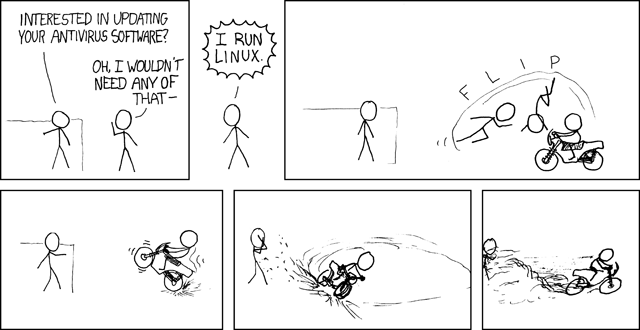deleted by creator
Nah, 2025 is the year of the Linux on the desktop.
we’re sure of it this time!
/s
I mean, I’ve been hearing it for 15 years, we can’t be wrong for that long, right? Which means that next year it’s 100%!
Yeah, I also think with just so few alternatives, just by pure chance alone this should already very probably be the year of Linux on desktop
Hey don’t give up on 2024 yet
Would it even be a good thing if Linux became super main stream? Maybe we should be careful what we wish for.
How would it be bad? More hardware support, more users not feeding data to corporations, more software support and so on.
I’m not sure. I envision a lot of regulatory stuff happening around the kernel as it becomes more popular & vital to infrastructure. As that happens, the direction of it becomes more controlled and eventually maybe becomes unrecognizable.
But maybe the fact it’s open source flat out prevents that?
I really don’t know, I’m not a futurists, I was just internet speculating.
The Linux kernel is already popular & vital to infrastructure, servers and Android exist
That’s true.
But Android getting more & more locked down as time goes on is a good example of what I’m afraid of might start happening once there are too many cooks in the kitchen.
I’m just speculating out of nowhere.
I thought of a good metaphor even though this thread is basically dead.
I used to smoke cigarettes. In the State I lived in at the time, Oregon, they taxed cigarettes, but not tobacco. So I learned to roll my own & would make around 80 cigarettes for the equivalent price of a single pack of prefabs.
Now, because lawmakers aren’t generally smokers, this flew under their radar for years. Until it didn’t. Then they sewed that loophole up tight pretty quickly.
Right now Linux is vital to our infrastructure, but I don’t think Lawmakers (& Oligarchs) really know that. I guess I’m a little concerned about what happens if they find out.
Security. The more popular a piece of software gets (including operating systems), it becomes a bigger attack surface for malicious actors to use.
Fundamentally, Windows security is not really that much of a swiss cheese people usually say it is. It’s just that more people (researchers and malicious actors alike) are actively looking for vulnerabilities in it.
I mean, Linux is the operating system pretty much all servers run. There’s probably many more machines running Linux than Windows. Sure, a new category of viruses would find its way over to Linux, but overall the security is good.
Not saying Windows sucks in that regard. But Windows sometimes just creates a stupid attack surface in their chase of squeezing every penny out of you.
i don’t see how this is annoying when it is literally posted to a community called “linuxmemes”
This is just a meme in a linuxmemes community. There is no need to be offended.
Im sure by next december arch will have 51% of desktop os market share.
I don’t.
Been using linux on my desktop since 1999. Don’t need an official declaration.
It’s really sad that this needs to be said. I 100% agree with the sentiment. The reason I use Linux is because most of my work requires Linux, but I resisted it for a really long time because communities like these are just incredibly toxic and insufferable. Sometimes looking at this community makes me want to rage-boot Windows and become a C# dev all over again.
It’s a meme in a linux meme community. You need help lol.
You are not annoying?
Pretty sure the success of Linux will not ride or die on the Charisma stat of its users.
In this case I actually mainly meant MacOS, which has a relatively big market share.Though for me personally it’s Linux, it applies to all other operating systems, with MacOS being the one large enough that people who use windows can’t ignore it. I’m not a fan of these “here’s what you need to know” titles because it doesn’t add anything, the title would be functionally the same without it. I was making fun of this by saying that I don’t need to know this and thus showing that (this part of) the title is only included to get more clicksI actually mainly meant MacOS
Maybe I’m just dumb or something, but you’re really burying the lede on this MacOS angle by having your meme say “Me with linux”
*guitar solo*
Frets On Fire solo
If you think being on Linux makes you immune for attacks, I have bad news for you.
there are much less vulrenabilities on Linux. No system is totally unpenetrable, but having 2-5 vulrebabilities is always better than having 30-40
I’ve got a link for you to click, Mr super secure OS user. I promise your OS will protect you.
Here I have a cool program to install. Just pipe this link into bash really quick…
With sudo. Can’t forget that or it won’t work.
you are just exploiting my words. I never said Linux will protect me whatever happens. But it will have a better protection inherently, than any windows
You’re holding onto a long-standing misconception: Linux is not inherently more secure than Windows. In fact, the opposite can be true.
The reason Linux seems safer is because it has a much smaller market share. Attackers don’t build massive botnets to target misconfigured Linux systems the way they do for Windows. But that’s not security—that’s just security through obscurity, which doesn’t hold up if someone is targeting you specifically.
Let me clarify my earlier point about “a link for you to click.” If an attacker is specifically targeting someone using Linux, they’re not any better protected than someone on Windows. At that point, it comes down to how well the user understands and secures their system.
The key difference? Windows actively warns you about misconfigurations that open you up to attack. For example, try enabling Remote Desktop Protocol—Windows will warn you repeatedly about the risks. Linux, on the other hand, won’t stop you. You can misconfigure SSH, open ports, or skip updates without a single warning. If someone’s after you and you’ve made a mistake? You’re toast.
Linux is powerful, but it doesn’t hold your hand the way Windows does. If you think it’s inherently secure, you’re just relying on the fact that fewer bots are looking for you—not that the system itself is protecting you.
Linux can be configured to have much better security, even by someone knowing a little about computers due to its open-source nature. And it is especially true to my case, since i’m an IT student Can you change to a hardened kernel on Windows? I use Helios kernel even on my android, which is designed to be more secure than the stock one. And there are distros which come preconfigured for security. Not much skill is needed to have a secure Linux system. But you can be a highly proficient sysadmin on Windows, but you will still depend on a few thousand Microsoft employees to fix your system. On Linux, there are millions of people and various corporations are actively working to make it secure, and even you could, if you are really highly skilled. For someone who doesn’t know what a pendrive is, yes, Windows might be more secure than something like Ubuntu or any basic distro (and they propably can’t use anything more advanced and secure by design).
But it doesn’t take much skill to choose a highly secure linux distro, like Bazzite, Garuda, or even Qubes and use it, or maybe even harden your own. Android, which is also based on Linux is not secure by default, but in the hands of the right person, it can be a suprisingly secure system
Jokes on you, dude is rocking Qubes /s
Do it
VMS is really fucking close to impenetrable.
Realistically the difference is in how Linux mitigates the common vectors for attack that Windows doesn’t. Most malware targeting individual workstations gets in by either supply chain attack, vulnerable web renderer or by tricking the user into installing it.
Centralized repositories with centralized build tooling limits opportunities for supply chain attacks, plus helps prevent users from accidentally downloading a Trojan when trying to grab other software. Containerizing web applications helps limit browser exploits, and less “features” phoning home means a default incoming-deny firewall policy will largely prevent most vulnerabilities from being remotely serious.
So for an individual workstation, Linux is significantly safer from viruses. In the enterprise it’s a completely different story where the threat environment does require defense in depth regardless of your choices of vendors
It probably makes you a less likely target though. I suppose that bots scan for known Widows vulnerabilities simply because that platform has a much higher market share among desktop operating systems. Besides, Linux distros offer a unified way to update all your software. On Windows, third-party software is often installed and maintained manually.
The way I have always liked to put it specifically is that Linux is not inherently more secure than windows. However Linux is inherently easier to secure than Windows. Namespaces, apparmor, seccomp-bpf, and a very fine grain limited vs super user permission system. Just to name a few top level things.
The tools are all there on basically any system, very well documented, relatively easy to use. And once you set them up they will not randomly change things on you. I say this as a system administrator having to deal with Windows constantly where Microsoft decides that they are smarter than you and fuck your group policy edits because we put out this update and we think this option is better so we’re going to revert like half the shit you did. Over half my fucking job and security is just checking what did Microsoft fuck up about my security set up with this update, and trying to rotate through security vendor 2094726 to fill in the absolute basic security processes that windows doesn’t provide
Regardless of us using Linux on our home computers, most businesses and services use Windows machines. Your information is likely still stored on Windows machines elsewhere if you interact with the world at all.
With that in mind, it’s worth being aware of Windows security problems when they come up.
Got it, stop interacting with the world
I was already mostly doing this so
What would we do when these happen? What could we do in the moment to change anything?
Join an eventual class action?
That’s the big “what if” that hangs over everything isn’t it?
Taking the internet into consideration, I would doubt “most”.
You’d be surprised. For medical info a lot of that is going to be sorted in windows servers running as either file or sql servers.
most servers actually also run linux, even microsoft(maker of windows) runs Linux on many of their servers. linux is just many times better in IO, ram , cpu, and networking. not only in compatibility and stability and security but also speed and latency. all those thigns matter to servers. that said many very small companies store things on a nas and then acces it with windows or mac computers. which can be very annoying if you work at such a place since then you have to use a unstable computer, which has almost no free ram or cpu and will chrash when it shouldn’t and you aren’t allowed to install Linux on it. but most of the internet runs Linux. actually GNU+Linux is by far the most used operatingsystem worldwide, not only pretty much all servers, and essentially all supercomputers run it, but android, and chrome os also are Linux, but they just run something like a box on it, and people only see the box instead of Linux. then many small devices also run it, and ofcource spacecrafts and such. in normal desktop use the score is much lower at around 2%, however that score is also affected a lot by how Linux users do not allow their os to be submitter automatically to some server, or that those are directly hosted by the developers who will not always share it with those public sources. next to that sites and such tracking what os people use are less likely to get the info from Linux users as they are much more likely to use security tools. steam might be seen as accurate as both on windows and Linux only select people use it, but then you only have that field of people, and then there was the bug where the steam hardware survey had a much smaller chance of triggering when running Linux(even though that might be fixed by now). based on stats for pc desktop use 1 in 50 people would use Linux on pc, however when looking at total use desktop is but a fraction from all computers worldwide.
I think the point of my comment is being missed a bit here friend. Servers and backend use Linux, sure. The actual number of Linux users is likely under reported as you say.
But I have yet to see Linux used as a workstation OS in a place of business. Every doctor, insurance broker, banker, registry, and retail place I’ve visited were using Windows machines to access their infrastructure. If Windows creates vulnerabilities at entry and exit points it can still compromise information.

People here running *nix OSes while I run a Nix*OS
Sometimes Mint tells me there are security updates available. Happened just this morning. Updating makes me feel good :)
And I can do it wherever I want. And my work is in no way interrupted, while the updates go through.
And it had the Edge of not installing Candy Crush
And put edge back in the taskbar…
I mean… a form of Microsoft Defender is available for Linux, but only for enterprise customers if I remember correctly 😅
Yep, my company allows me to use Linux but for Compliance Reasons I need to have Microsoft Defender installed and running. Still beats Windows 11 by a mile
and it will suck your servers dry.
Eh, it’s not too bad when properly configured.
Is not having an anti-virus good for most people though?
most antivirus apps are very invasive, heavy on resources and even spy on you. Windows defender is usually enough. However, virustotal is still recommended
Is this something that someone who doesn’t have tech as a hobby cares enough about to change they’re os?
I would say yes? Many if my friends in uni were using laptops that had McAfee built in. I’m not exaggerating when I say they were unusable. I removed that shit and those machines were snappy af.
On one side, if you have a brain you’re fine.
On the other side, *glances at general public typing google.com into google* …yeahAnti-virus is not going to stop you from stupidity. You classic “Anti-virus” won’t stop anything more than run of the mill simple stuff.
Most of the time that’s what people need an antivirus for, most attacks the average person will suffer will be some script that’s easily caught by the antivirus.
If the script doesn’t have permission to do anything it doesn’t matter. See Android as an example.
Same for people using windows 7
there is an update, i applied it at the weekend
These YouTube channels not even aknowleging other operating systems than Windows like ThioJoe kinda annoy me
the same with the apple statement of appleram being 2 times better than other ram because they copied a old version of one of the memory compression methods supported by Linux for years. Linux ram is even better.
Bootkitty?
However,
you can already patch your BIOS to become secure again! :)All in all, Windows security is a joke compared to Linux’s.
Windows security is… fine? It could be better, but it’s pretty much on par with linux security. Both have their vulns, but they’re both also able to be secured enough that most (if not all) major data breaches are via phishing or other social engineering attacks, not solely software exploits. There’s lots of fodder for the Linux vs. M$ debate, but this one is maybe a bit out of date.
If you actually dig deeper into the Linux security topic, you’d find out that Linux is actually not very secure. GrapheneOS developers made quite a lot of posts on what Linux distros (and the kernel) are missing in terms of security. A lot of “Linux security and the lack of viruses” rides on the waves of “there is hardly any point of creating malware for a system with such a small user base, plus you have to consider the fact that people knowledgeable enough just to install a Linux distro would be a bit more careful about their computers than the average Joe”.
there is hardly any point of creating malware for a system with such a small user base
Actually the whole world runs on linux, Windows is mostly the low level consumer end.
Which makes your argument true for a certain segment of malware (the cheap low tech stuff more akin to scams etc targeting people en mass but expected to have a low return), but not actually for the parts where the money is that justify elaborate malware and hacks.
The internet runs on linux.
(Webservers, some network equipment, monitoring servers, NAS, DNS, … lots of services can be setup and ran for free on linux. ((Companies like free)))
A lot of companies stuff also runs on linux when it’s not free, just so they can avoid having to manage the hardware side… see: Google Cloud, AWS, Azure etc.
The amount of companies having their whole infrastructure run by one of the big cloud services on linux servers nowadays is far too high to make a serious argument of “linux is only secure because it’s irrelevant and no one cares to break it”.
Most companies like free. Larger companies like support contracts and shifting liability.
Yeah, Linux has SELinux, that thing everyone turns off!
And AppArmor
I want a Linux system that is entirely rootless by leveraging containers and service accounts.
Think about it. Instead of having root you could just have a utility that connects to a daemon that is in a sandboxed environment.
bootkitty wasn’t implemented ever and if you use GUID Partition Table and your bios is set to uefi without csm, it can’t affect you, since Bootkitty embeds itself into the Master Boot Record and there exploits the LogoFail vulrenability (this was already patched btw) with as far as i remember, a self-extracting steganographical bitmap image for arbritary code execution to bypass Secure Boot with injecting face certifications to Moklist. Also, it only runs on select devices, far from all Linux systems are vulrenabe.
Man I’m just trying to get my external speakers to work without blaring static whenever the powersave kicks in, and nobody seems to know what to do 🤷♀️





















